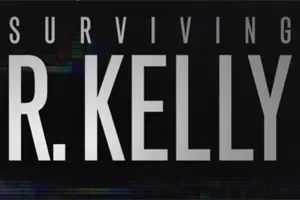Surviving R. Kelly tells an important story, but Lifetime's salaciousness hampers its message
-

The reality TV visual tics and sound effects employed by Lifetime's six-part docuseries obscured the vital message of its survivor-led oral history, says Sonia Saraiya. Surviving R. Kelly "is a genre piece," she says. "Not science fiction or fantasy—it is difficult not to believe every painful word of this miniseries—but a uniquely televisual genre: the unscripted exposé. The story of R. Kelly and his alleged victims has been given the Lifetime treatment: shaky stock footage, melodramatic audio accompaniment, that suspense-heightening gimmick that transforms a provocative image into a haunting negative. Heavy-handed incidental music burbles and buzzes over every wrenching interview of dream hampton’s docuseries, through the words." Saraiya adds: "The Lifetime treatment is not the right genre for this story, with its catastrophic destruction and sprawling cast. The sound cues of unscripted television, with their irresolute, seedy flourishes, should have no place here, against this scale of human frailty and psychological devastation. Surviving R. Kelly is telling a complex story, but its tabloid sheen obscures its own profundity—and that salacious skin never lets up, through all six hours of the series. Horrifying as their content is, episodes even tend to repeat themselves, based on the assumption that the viewer can’t be bothered to pay more careful attention to what’s happening on-screen."
ALSO:
- Surviving R. Kelly is an extremely effective piece of activist entertainment journalism: "The series is comprehensively damning and powerfully disturbing—while also being riveting, a slightly queasy combination that makes perfect sense on Lifetime, a channel whose specialty has long been wringing thrills and warnings from stories about endangered women," says Willa Paskin. "As with all true crime, there is a fine line between getting the truth out and getting it out salaciously. If Surviving R. Kelly occasionally steps over that line—it can be a little too slick, particularly in the last two episodes when it seems like it wants to make news, instead of document it—it does so to make an undeniable and sickening case against Kelly."
- Surviving R. Kelly is furious, punishing, and necessary, and its fury derives from how unnecessary it should be here in 2019
- Is Surviving R. Kelly enough to end his career?
- Jada Pinkett Smith is questioning why R. Kelly sales and streams have increased since Surviving R. Kelly premiered last Thursday
- Surviving R. Kelly producers are glad to have started a national conversation: "For us as a team, it's been an unbelievable privilege to have created content that impacts culture and says something after the hour is over," says executive producer Brie Miranda Bryant. "And I think as a nation we're now recognizing that the impact that content can have on culture is extremely powerful and/or healing. I think where we are right now, it feels refreshing."
- Facebook removes page that aimed to "expose" R. Kelly accusers
- How to watch Surviving R. Kelly if you don't have cable
TOPICS: Surviving R. Kelly, Brie Miranda Bryant, dream hampton, R. Kelly, Documentaries, Reality TV
More Surviving R. Kelly on Primetimer:- TV documentaries are having a real-life impact, from Framing Britney Spears to Surviving R. Kelly to Who Killed Malcolm X?
- TV helped take down R. Kelly after the music industry coddled him
- R. Kelly found guilty of sex trafficking underage girls, facing 10 years to life imprisonment
- From Framing Britney to Allen v. Farrow: Documentaries are influencing how celebrities are perceived
